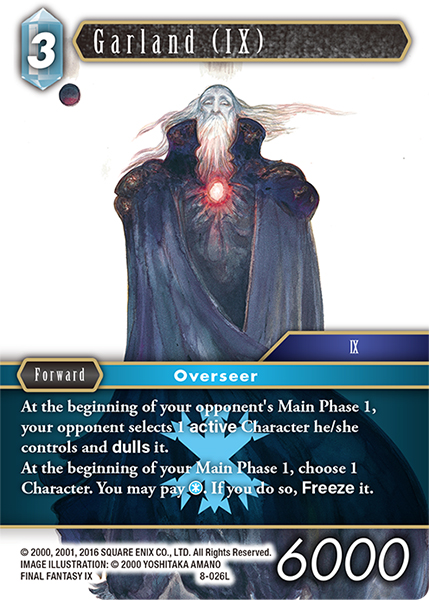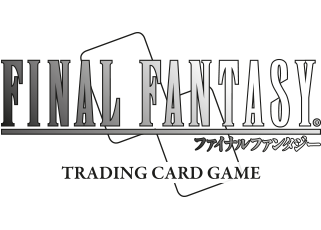
Hello, everyone! I’m Tarou Kageyama, FF-TCG Development Producer. We’re still facing difficult times, and unfortunately, because of this, are not able to offer as much support as we’d like to in the way of events and products, but I’d like to at least keep these articles going at a regular pace. I’ll also be including some information that I’ll only divulge here, so I hope this might help lift spirits, even if it’s just by providing something to pass the time.
Well then, the theme I’d like to discuss this time is “Jobs,” one of the components found on each character card. Let’s get started.
Jobs in FF-TCG
This might feel like a pretty random thought, but it’s probably a known fact among all our players that the term “Job” as used in FF-TCG differs slightly from the original meaning of the word “job” in a general sense. A “Job” in this game indicates not only a person’s occupation but also what sort of existence they represent as a character. For example, “Bard” and “Soldier” are “jobs” in a so-called traditional sense, but things like “Archfiend” and “L’Cie” are rather removed from that definition of “job.” And, when we go even further and get to “Moogle” and “Remnant,” referring to them as “jobs” in the word’s original sense might be pushing it just a bit too far.
However, the word “Job” represents a component that you simply can’t go without mentioning in a discussion of FINAL FANTASY. In fact, a variety of jobs exist in the FINAL FANTASY series. Not only do we have the famous ones like “White Mage,” “Black Mage,” “Monk,” and “Warrior,” but there are also many more that might surprise you and make you think, “I didn’t know this was a job, too!” For example, the “???” Job for The Mask [8-028R], Hooded Man [11-054R], and Man in Black [11-093H] also appear in their original games as their Jobs. So in effect, it’s an officially recognized “Job” in FINAL FANTASY.
 |
 |
 |
About ten or so years ago when I was drafting up ideas for the Chapter series, I decided to call this part of the card, which indicates a character’s position in the game, their “Job.” Again, this is a departure from the definition of the general word “job,” but for a game within FINAL FANTASY, where so many different jobs exist, I thought it wouldn’t be bad to use the word “Job” here. I think this, in and of itself, probably wasn’t such a bad idea, personally. Regardless, I do think that perhaps I expanded the concept of Jobs a little too unsystematically, but more on that later. For this reason, we’ve now begun making a gradual directional change.
In between the original titles and TCG
The task of assigning each character these “Jobs” is, to be perfectly frank, vastly more difficult than deciding a card’s element, rarity, or illustration. It’s immensely helpful when a character already has a clear “Job” in their original game. For example, in FINAL FANTASY IV, Edge is a “Ninja” while Kain is a “Dragoon,” and these facts are unwavering. It’s also easy in situations like Yuna’s “Summoner” or Zack’s “SOLDIER,” where their jobs are clearly portrayed as fact in their original worlds. “Archfiend” and “L’Cie,” which I mentioned earlier, would also be in the straight-forward category because the characters are positioned clearly in their games (though it may be debatable whether these are actually “Jobs”). I expect that not many people would object to Cagnazzo [3-130R] being an “Archfiend.” However, we also have some characters who are extremely difficult. There are even a considerable number whose Jobs we assigned in fits of desperation. The playable characters can usually be assigned without reaching very hard, but very often we’ll find ourselves stuck ruminating over what to do with the enemy characters. Characters like Barnabas [5-045H] the “Mech” and Garland (IX) [8-026L] the “Overseer” are examples of those that I wish I could have done a little more for somehow.
 |
 |
Additionally, on one hand we want the Jobs to be meaningful for the game’s mechanics to some extent since they’re one of the card’s components, but we also want them to work as a function that helps convey the feel of the original title. What’s troublesome about a clear but very specific Job is that it makes it difficult to receive the benefits of abilities that strengthen Jobs. This sort of thing, where we need to balance the game’s mechanics with the original title’s feel, is another hefty task.
Another challenge, this time forming a different vector, lies in language differences. This factor imposes a number of restrictions on Job determination. For example, two words that are similar but different in Japanese could be one and the same in English or another language. This would mean that two Jobs that are different in Japanese could turn out to be the same in English, in which case it would not be usable in FF-TCG. Of course, if we find ourselves facing the reverse scenario, where two unique English words were the same in Japanese, we’d end up having to forgo that Job, too. Additionally, depending on the language, there are cases in which nouns are changed depending on the properties of the subject. All these language-specific challenges need to be overcome before we’re able to finalize a Job name. When it comes to the subject of translation/localization, from card name to word length, there’s enough discussion to be had there to warrant its own dedicated article, but it’s a similarly delicate task in relation to Jobs as well.
Future developments
I’ve talked a bit about the formidable challenges that “Jobs” present, but on the other hand, they can be used as part of the game mechanics as well as to capture the feel of their original games, so they’re a component that, while difficult, I enjoy. The only thing is that over these three and a half years, having come all the way through Opus XI in booster sets, I think that maybe now we’re seeing some need for a little course correction, as I touched upon earlier. Though this would take place in gradual steps, I’d like to stop having ones that are a bit too far removed from “jobs,” like “Youth” and “Girl” for example. There may likely be more specialized Jobs derived from the original titles and specific to individual characters, while conversely, I think those that can be considered neither characteristic nor appropriate as Jobs will tend to be less common.
Also – and this is still just a personal idea I have and it isn’t as if I ran this by the development team, so please take this with a grain of salt – I think it would be interesting if we also had characters with multiple Jobs. For example, Alphinaud could be “Scion of the Seventh Dawn / Crystal Braves,” while Onion Knight could be “Warrior of Light / Ninja” – something like that. If they had multiple Jobs from the beginning instead of giving it to them as an ability, it should be possible to think of game mechanics based on that too. Jobs are a component specifically included on the cards, after all, so I believe that developing them more as we move forward will also help lead to developing FF-TCG more as a whole.
Well then, I think this is a good place to stop this time. Next time, I’d like to switch gears a little bit and introduce a few cards I’m particularly fond of in FF-TCG, along with the basic thoughts behind them. Until next time!
